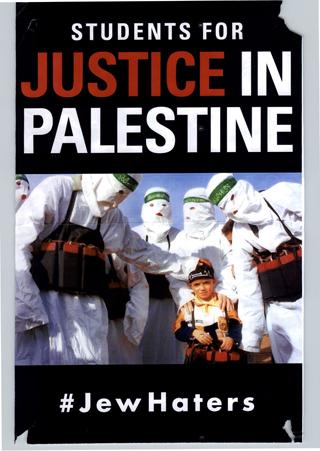Several inflammatory posters titled “Students For Justice in Palestine” with the hashtag “Jew Haters” emblazoned on the bottom appeared throughout the college last week, prompting debate among the administration and faculty members about free speech versus hate speech.
One set of posters showed images of suicide bombers. Other posters showed a mother and child armed with guns. The meaning of the label “Jew Haters” was unclear. Some assumed it used anti-Semitic speech while others viewed it as an attack on the SJP. However, author and right-wing activist David Horowitz took credit for the posters.
Several other campuses reported similar incidents, including UCLA; however, in an interview with the Jewish Journal, Horowitz said that he would not name all of the targeted campuses to protect the anonymity of the students involved in posting up the fliers.
Horowitz also told the Jewish Journal that the posters are part of an effort to “raise awareness of the epidemic of Jew hatred on college campuses, like at UCLA,” stating that the SJP is not just critical of Israeli policies. Rather, he referred to the organization as a “hate group” that is anti-Israel.
He said that he does not want the government or UCLA to infringe upon the SJP’s free speech rights; however, he wants the organization labeled as a “hate group” so that its status as a student group is revoked, which would take away the privileges and funding appropriated for student organizations.
Adjunct English professor Howard Ibach said that free speech must be tolerated, even if the ideas being expressed “boil your blood.”
College President David Viar wrote in an email interview Tuesday that the posters are “inflammatory, hateful, and offensive,” but believes that “a Court would consider them protected free speech” and thus would not permit “such speech to be censored just because it is hateful and offensive.”
“GCC is an institution of higher learning,” Viar said. “When any incident such as this occurs, it provides an opportunity for engaged dialogue, thoughtful investigation of the various perspectives and positions, testing our critical thinking and analysis skills and helping us improve our communication skills in response to propaganda.”
Once campus police were notified, chief of police Gary Montecuollo asked one of his officers to investigate. A faculty member saw one of the posters near the piano kiosk. Police checked to see if there were other posters in undesignated areas.
According to Montecuollo, posters, fliers, and ads can only be displayed in certain areas inside the campus, such as bulletin boards or A-Frames from the student center. They may not be posted on walls, the sides of kiosks, or vending machines because tape or glue can damage the property.
Montecuollo said police only removed a poster improperly displayed on a vending machine outside of the San Gabriel building. They did not remove others on campus because they do not address the content of postings to determine whether or not they are hate incidents.
“We have to be objective in the process of analysis,” Montecuollo said.
Once campus police see a potential hate incident, they report to the Glendale Police Department for further investigation.
Glendale Police Detective Lt. Tim Feeley said that they classified the posters as a hate incident.
“It was a mean thing for somebody to put up,” Feeley said, but the fliers are not indicative of a racial tension issue at Glendale College.
Horowitz’s actions received backlash from Jewish and pro-Israel organizations at UCLA, including but not limited to Bruins For Israel Executive Board, Chabad House at UCLA Student Board, and J Street U at UCLA. In a statement released by the Daily Bruin, the groups condemned the posters that dubbed the SJP an anti-Semitic organization.
“While we have in the past condemned speakers sponsored by SJP for their anti-Semitic rhetoric and believe the inappropriate singling out of Israel to be discriminatory, we wholeheartedly condemn these actions and the malicious intent behind them,” the statement read. “This sort of hostility and offensive language has no place on a university campus, especially one as diverse as UCLA.”


